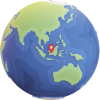Case studies are organised by region, with each region featuring links to the countries where the case studies are located.
Myanmar

A six-month investigation by Global Witness has revealed that the illegal mining of heavy rare earth minerals in Myanmar has led to severe human rights abuses and environmental devastation. Rare earth minerals have started to be predominantly sourced from Myanmar following the closure of many Chinese mines due to environmental concerns. These mining operations are largely illegal and occur in the semi-autonomous Kachin State, controlled by militias with ties to the Myanmar military junta. This situation has led to severe human rights abuses. Employees work in conditions of exploitation, with local workers, including children, employed in hazardous conditions without proper permits or legal protections. In addition, employees face discrimination, with Chinese workers occupying skilled positions, while Burmese workers do manual labour. Locals also face threats and violence from militia groups if they resist giving up their land for mining. Illegal mining in Myanmar also leads to environmental degradation, as the mining techniques used have poisoned local water sources and caused deforestation. Communities are losing access to clean drinking water, and their agricultural products are contaminated, causing illness. This has created a situation of significant displacement of local populations.
Keywords: South East Asia & Pacific, Myanmar, minerals, primary production, illegal mining, human rights violations, labour rights violations, environmental crime
Sources: https://www.globalwitness.org/en/campaigns/natural-resource-governance/myanmars-poisoned-mountains/
https://www.globalwitness.org/en/campaigns/natural-resource-governance/addressing-risks-supply-chain-heavy-rare-earth-minerals-illicit-mining-myanmar/

According to a report by Global Witness, the military junta in Myanmar heavily relies on the country’s gemstone industry for funding, including through rubies, sapphires, and other coloured stones. The military’s exploitation of these minerals is illegal, since all mining licences expired in 2020. Despite this, mining has surged since the coup in 2021, with tens of thousands of informal miners exploited by the military and armed groups. In addition, the military systematically collects bribes from informal miners in key extraction areas. The complex supply chains obscure the origins of the gemstones, making it difficult for buyers to monitor ethical sourcing. Consequently, multinational jewelers may be exposed to rubies that are linked to the funding military abuses; only four of over 30 allegedly implicated companies have publicly declared that they have stopped sourcing from Myanmar.
Keywords: South East Asia & Pacific, Myanmar, minerals, primary production, illegal mining, human rights violations, labour rights violations, environmental crime
Sources: https://www.globalwitness.org/en/campaigns/natural-resource-governance/conflict-rubies-how-luxury-jewellers-risk-funding-military-abuses-myanmar/

In southeastern Myanmar, rubber production has been linked with conflict financing, according to a 2020 report by Forest Policy Trade and Finance Initiative. Particularly in the Tanintharyi Region, rubber has been used to finance long-standing ethnic conflicts involving various rebel groups and the national military (the Tatmadaw). Indeed, Mon businessmen, who are often the former commanders of the Mon National Liberation Army (MNLA), the armed wing of the New Mon State Party (NMSP), have used their connections to establish rubber plantations in northern Tanintharyi. The expansion of rubber plantations by these businessmen, backed by the NMSP, effectively finances the rebel group by providing economic resources and territorial control. The establishment of rubber plantations on lands designated as ‘wastelands’ or ‘vacant lands’ by the government allows Mon businessmen to gain official land use rights. However, this process disenfranchises Karen communities, who previously inhabited these lands before being displaced by the Tatmadaw, and finances the ongoing conflict.
Keywords: South East Asia & Pacific, Myanmar, rubber, primary production, terrorist and conflict financing
Sources: https://www.forest-trends.org/wp-content/uploads/2020/07/MN_Conflict_Rubber_FINAL-1.pdf

According to a report by Mongabay, WOB Timber, a logging company based in Hamburg, German, was fined $4 million by a Hamburg Court for illegally trading Myanmar teak, violating EU sanctions. It was revealed that WOB Timber imported teak from Myanmar by falsely declaring it as originating from Taiwan. By doing so, the company violated EU sanctions on Myanmar wood imports, enforced between 2008 and 2011. In addition, it is frequent for Myanmar exporters to exaggerate the processing level of timber to evade the Special Goods Tax and pay reduced Myanmar Customs Tariff. Consequently, private companies such as WOB Timber, that trade with state-owned Myanma Timber Enterprise (MTE), benefit from these tax evasions. It was also found that WOB Timber used intermediaries in Croatia to bypass German law enforcement. The Environmental Investigation Agency (EIA) revealed that WOB Timber paid Croatian firms to land Myanmar teak, circumventing the EU Timber Regulation.
Keywords: South East Asia & Pacific, Myanmar, timber, trade and transport, fraudulent documentation, sanctions evasion
Sources: https://news.mongabay.com/2021/05/trafficking-of-banned-myanmar-teak-lands-german-company-with-4m-fine/#:~:text=A%20March%2017%20EIA%20report,exporting%20wood%20products%20from%20Myanmar


The Environmental Crimes Financial Toolkit is developed by WWF and Themis, with support from the Climate Solutions Partnership (CSP). The CSP is a philanthropic collaboration between HSBC, WRI and WWF, with a global network of local partners, aiming at scaling up innovative nature-based solutions, and supporting the transition of the energy sector to renewables in Asia, by combining our resources, knowledge, and insight.


